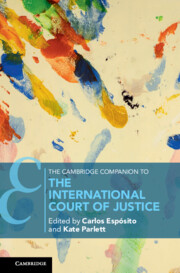Book contents
- The Cambridge Companion to the International Court of Justice
- Cambridge Companions to Law
- The Cambridge Companion to The International Court of Justice
- Copyright page
- Contents
- Contributors
- Preface
- Introduction
- Part I The Role of the ICJ
- Part II The ICJ and International Dispute Settlement
- Part III The Impact of the ICJ’s Jurisprudence
- 14 The Law of Treaties
- 15 Territorial Disputes
- 16 The Law of the Sea
- 17 International Environmental Law
- 18 The Law of State Responsibility
- 19 Jurisdictional Immunities
- 20 The Use of Force
- 21 International Organisations Law
- 22 Human Rights
- Index
- References
21 - International Organisations Law
from Part III - The Impact of the ICJ’s Jurisprudence
Published online by Cambridge University Press: 18 May 2023
- The Cambridge Companion to the International Court of Justice
- Cambridge Companions to Law
- The Cambridge Companion to The International Court of Justice
- Copyright page
- Contents
- Contributors
- Preface
- Introduction
- Part I The Role of the ICJ
- Part II The ICJ and International Dispute Settlement
- Part III The Impact of the ICJ’s Jurisprudence
- 14 The Law of Treaties
- 15 Territorial Disputes
- 16 The Law of the Sea
- 17 International Environmental Law
- 18 The Law of State Responsibility
- 19 Jurisdictional Immunities
- 20 The Use of Force
- 21 International Organisations Law
- 22 Human Rights
- Index
- References
Summary
This chapter assesses the contribution of the ICJ to the law of international organisations. It emphasises the limited role of the Court in this field, setting out the multiple reasons for this: parts of the law were developed before the Court commenced its work; and the Court has only had intermittent opportunities to consider it through its cases. The author argues that the Court’s approach reflects a more general ambivalence of classic international law when it comes to international institutions: that it emphasises the centrality of States in the international legal system, notwithstanding the steps that have been taken by States to institutionalise significant areas of international law.
Keywords
- Type
- Chapter
- Information
- The Cambridge Companion to the International Court of Justice , pp. 470 - 485Publisher: Cambridge University PressPrint publication year: 2023

